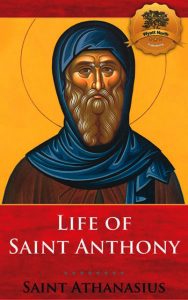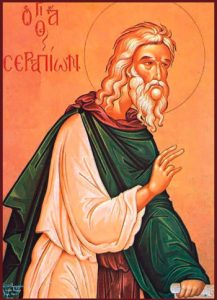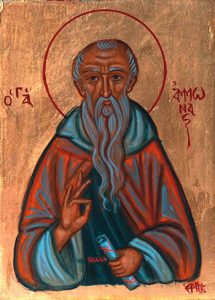A School for Prayer (8)
The Way of the Desert (2)
The Four Principles of the Spiritual Life
By Fr Craig Larkin SM, 1943 - 2015
A spiritual framework begins to develop
The four simple and practical Imperatives -- “Stay in your cell!,” “Watch yourself!,” “Be attentive!,” “Do not judge!” -- contained the beginnings of a theory of the spiritual life. In time, such a theory of the spiritual life began to emerge, basing itself round four qualities, described in four Greek words: Metanoia, Penthos, Nepsis, and Apathaeia.
 Metanoia
Metanoia
The basic meaning of the Greek word metanoia is a change in one’s outlook or way of thinking: a change of mind.
This metanoia was evident in the life of Anthony, the first great Desert Father. Anthony heard the word of the Lord as being spoken to himself: he did not hesitate: he immediately went out and gave everything to the poor. He then went into the desert -- Athanasius, Life of Anthony.
The important feature of metanoia was the decision to focus one’s life on searching for God by following Jesus, and then bringing all of one’s actions and decisions into line with this single goal.
Sometimes, metanoia meant a conversion from a life of sinfulness, renouncing the sin and cutting off the things that led to sin.
This form of metanoia – repentance – was not just a single act, but a process. The desert way involved continually remembering one’s sins and weeping over them in penitence.
To repent in the Biblical sense means not simply to lament and turn away from sin, but to turn towards God.
Macarius of the Desert emphasises that because God is love, God always “awaits with great patience the repentance of every sinner.” At the same time, Macarius warns of the danger of taking God’s forgiveness for granted, not because God might change his mind about forgiving us, but because we might grow so distant from God that we might no longer feel the need to repent.
Metanoia is never finished. It is something that has to be practised every day.
Abba Serapion sold his book of the Gospels and gave the money to those who were hungry, saying, “I have sold the book which told me to sell all that I had and give to the poor.”

Abba Serapion
Penthos
The act of conversion includes a down-to-earth truth: in our lives we have sinned.
Our belief that our God is all loving and all-forgiving must include the truth that God forgives something – namely our personal sins.
This conviction leads to sorrow for sin and to carefulness about not offending again -- fear of the Lord.
This is the state of penthos.
Repentance is the daughter of hope and the denial of despair -- John Climacus.
Repentance is not despondency, but eager expectation. It is not self-hatred, but the affirmation of my true self as made in God’s image. To repent is to look, not downwards at my own shortcomings, but upwards at God’s love; not backwards with self-reproach, but forwards with trustfulness.
In the thinking of the Desert Fathers, Penthos included the gift of tears: not the tears of regret and shame, but the “warm tears” which come from knowing that we are sinners -- but redeemed, forgiven and loved sinners.

The gift of tears
Tears are a gift of God. The gift of tears is viewed as a ‘second baptism.’
Many people experience this gift, often in moments of retreat or prayer. Spiritual directors need to be aware of this.
Fear of the Lord produces tears, and tears produce joy. Joy brings strength, through which the soul will be fruitful in everything -- Abba Ammonas.
Nepsis
Time and again the Abbas advised their disciples: “Watch yourself!”
Nepsis is the state of watchfulness.
It is the attitude of the person who takes a hard, honest look at the inner self, checking to see what was going on in there; recognising the subtle twisted motives at play in the heart, and seeing the danger lurking in the form of thoughts and intentions.
This hard-nosed examination of one’s inner self, carried out in the loneliness of one’s cell, and perhaps with the help of a spiritual father, was a key element in desert spirituality.
This state of watchfulness or Nepsis was such a characteristic of the Desert Fathers that they became known as the ‘Neptic Fathers.’
Nepsis is the exact opposite of ‘forgetfulness of God,’ ‘lack of awareness,’ ‘negligence,’ and ‘spiritual drowsiness.’
When we are ‘on watch,’ vigilant and attentive, living totally in the present, we become alert to God’s presence.
Observe your thoughts, and beware of what you have in your heart and your spirit -- Abba Elias.
 Apathaeia
Apathaeia
The object of the struggle in the Christian life is to reach a state called Apathaeia.
Apathaeia is the state of deep calm, tranquility and peace of heart.
It is how St Athanasius described St Anthony of the Desert: He emerged from his cave: equal to himself, governed by reason, natural.
This is the state of one who acts ‘from the inside out.’ I live now not with my own life but with the life of Christ who lives in me -- Galatians 2: 20.
This state of Apathaeia comes as a result of the monk’s struggle:
• Facing solitude with courage
Stay in your cell!
• Looking honestly at one’s inner self
Watch yourself!
• Guarding one’s heart and thoughts
Be attentive!
• Not comparing oneself with others
Do not judge!
Apathaeia gives birth to love, and love leads us to spiritual knowledge and to prayer. In the state of Apathaeia a person is able to pray in peace, and without distraction.
We can recognise the signs of Apathaeia by our thoughts during the day, but we also recognise it by our dreams during the night. Evagrius of Pontus
Ten golden rules of the Desert Fathers on prayer
1. The foundation of the spiritual journey is the Word of God in the Scriptures.
2. The spiritual life is a struggle: it involves ‘good spirits’ and ‘bad spirits.’
3. The one who sets out on the spiritual journey by himself is bound to get lost.
4. Make use of the things that will help you to ‘wake up!’ to ‘watch yourself!’ and to ‘be attentive!’
5. Remove the things that take away inner silence.
6. Our spiritual life is measured by what we do, how we behave, what we decide, rather than what we say.
7. Prayer does not need to be complicated, and prayers do not need to be long.
8. Prayer is an act of desire. When you pray, know what you want.
9. What you want to be during prayer, you should also be before and after your prayer.
10. Only those who have learned how to live in community can live alone.
To be continued
Tagged as: Metanoia, prayer
Comments are closed.
 Entries(RSS)
Entries(RSS)